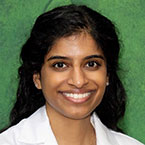By: Jessina Thomas, MD & Christine Waasdorp Hurtado, MD, FAAP
Eosinophilic esophagitis (EoE) is an allergic condition that affects the esophagus, the tube that connects the mouth and stomach. It can make it difficult or painful to eat. EoE is more common in kids who have a history of allergies or asthma, especially males.
While EoE is a chronic (life-long) condition, several treatment options are available to manage it. Learn more here.
How does EoE affect a child?
In a child with EoE, the body reacts to certain foods or other allergy triggers as a threat. The immune system releases white blood cells called eosinophils, which normally fight germs. The eosinophils build up in the lining of the esophagus. This can cause inflammation and narrowing that makes it hard or painful for food to go down smoothly.
What are the symptoms of EoE?
One symptom that kids of all ages may have is reflux. Also called gastroesophageal reflux (GER), reflux occurs when stomach contents flow back up into the esophagus. Other EoE symptoms vary by age.
Infants and young children with EoE may have:
EoE symptoms in older children & teens may include:
How is EoE diagnosed?
A child with possible EoE symptoms may be referred to a pediatric gastroenterologist. For an EoE diagnosis, an upper GI endoscopy (esophagogastroduodenoscopy) is needed to directly view the esophagus lining.
During the endoscopy, the doctor uses a long, flexible tube with a camera at the end. This is inserted through the mouth and down the esophagus while the child is asleep. The doctor will look for signs of swelling. In addition, biopsies (small tissue samples) of the esophagus are collected. These samples are evaluated for the presence of eosinophils under a microscope.
How is EoE treated?
There is currently no cure for EoE, but several treatments can control symptoms. EoE treatment decreases the swelling in the esophagus, allowing kids to live normal lives. A child or teen with EoE may need one or more of the treatments below:
Elimination diet therapy
If the swelling is triggered by specific foods, the doctor may advise to completely avoid eating those foods. This is called an elimination diet.
The most common food triggers for EoE include milk, soy, wheat, egg, seafood and nuts. Once a child's inflammation is controlled, different foods can be slowly reintroduced back into their diet. The doctor will monitor the patient's symptoms closely by repeating an upper endoscopy with each reintroduction.
Medications for EoE
Proton Pump Inhibitors (PPI): These medications can improve symptoms by decreasing acid production in the stomach. However, most patients' inflammation/swelling and symptoms do not resolve completely while on PPI's.
Steroids: These medications help control inflammation. Fluticasone and budesonide are commonly used. These medications are swallowed allowing the steroids to reduce the swelling.
Biologics, a type of medicine that affects a specific part of the immune system involved in how eosinophils act. Biologic medications may be given to children and teens with EoE that is more difficult to treat or has not responded to other medications.
What are possible complications of EoE?
EoE treatment can control symptoms and help prevent complications. Uncontrolled swelling for extended periods of time can cause the esophagus to narrow. When this happens, food can get stuck in the esophagus.
When a food blockage occurs, an upper endoscopy may be needed. The procedure can stretch or dilate the esophagus. This typically resolves the problem.
Young children with EoE may develop more severe and prolonged feeding problems. These children might need a special liquid nutrition formula or
feeding therapy. In very serious cases, they may need a small gastrostomy feeding tube (G tube) placed to help them get enough food and water.
More information
About Dr. Thomas
 Jessina Thomas, MD, is a pediatric gastroenterologist in Texas and an Assistant Professor in the Department of Pediatrics at UT Southwestern Medical Center. She is a member of the American Academy of Pediatrics and North American Society of Pediatric Gastroenterology and Nutrition. Jessina Thomas, MD, is a pediatric gastroenterologist in Texas and an Assistant Professor in the Department of Pediatrics at UT Southwestern Medical Center. She is a member of the American Academy of Pediatrics and North American Society of Pediatric Gastroenterology and Nutrition.
|
About Dr. Waasdorp Hurtado
 Christine Wassdorp Hurtado, MD, MSCS, FAAP, is a member of the American Academy of Pediatrics Section on Gastroenterology, Hepatology and Nutrition and the North American Society of Pediatric Gastroenterology Hepatology and Nutrition. She is an Associate Professor of Pediatrics at the University of Colorado School of Medicine and practices in Colorado Springs. Christine Wassdorp Hurtado, MD, MSCS, FAAP, is a member of the American Academy of Pediatrics Section on Gastroenterology, Hepatology and Nutrition and the North American Society of Pediatric Gastroenterology Hepatology and Nutrition. She is an Associate Professor of Pediatrics at the University of Colorado School of Medicine and practices in Colorado Springs. |